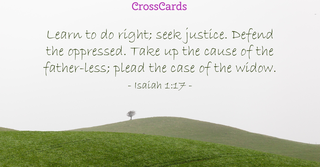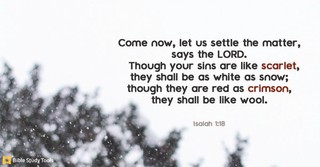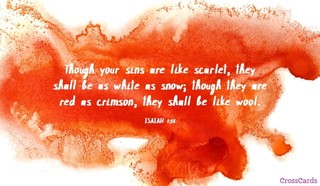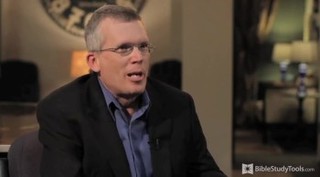- Recent Translations
- All Translations
Isaías 1
Share
Settings
Videos for Isaías 1
Isaías 1 Commentary
Chapter 1
Isaiah prophesied in the reigns of Uzziah, Jotham, Ahaz, and Hezekiah. He has been well called the evangelical prophet, on account of his numerous and full prophesies concerning the coming and character, the ministry and preaching, the sufferings and death of the Messiah, and the extent and continuance of his kingdom. Under the veil of the deliverance from Babylon, Isaiah points to a much greater deliverance, which was to be effected by the Messiah; and seldom does he mention the one, without alluding at the same time to the other; nay, he is often so much enraptured with the prospect of the more distant deliverance, as to lose sight of that which was nearer, and to dwell on the Messiah's person, office, character, and kingdom.
The corruptions prevailing among the Jews. (1-9) Severe censures. (10-15) Exhortations to repentance. (16-20) The state of Judah is lamented; with gracious promises of the gospel times. (21-31)
Verses 1-9 Isaiah signifies, "The salvation of the Lord;" a very suitable name for this prophet, who prophesies so much of Jesus the Saviour, and his salvation. God's professing people did not know or consider that they owed their lives and comforts to God's fatherly care and kindness. How many are very careless in the affairs of their souls! Not considering what we do know in religion, does us as much harm, as ignorance of what we should know. The wickedness was universal. Here is a comparison taken from a sick and diseased body. The distemper threatens to be mortal. From the sole of the foot even to the head; from the meanest peasant to the greatest peer, there is no soundness, no good principle, no religion, for that is the health of the soul. Nothing but guilt and corruption; the sad effects of Adam's fall. This passage declares the total depravity of human nature. While sin remains unrepented, nothing is done toward healing these wounds, and preventing fatal effects. Jerusalem was exposed and unprotected, like the huts or sheds built up to guard ripening fruits. These are still to be seen in the East, where fruits form a large part of the summer food of the people. But the Lord had a small remnant of pious servants at Jerusalem. It is of the Lord's mercies that we are not consumed. The evil nature is in every one of us; only Jesus and his sanctifying Spirit can restore us to spiritual health.
Verses 10-15 Judea was desolate, and their cities burned. This awakened them to bring sacrifices and offerings, as if they would bribe God to remove the punishment, and give them leave to go on in their sin. Many who will readily part with their sacrifices, will not be persuaded to part with their sins. They relied on the mere form as a service deserving a reward. The most costly devotions of wicked people, without thorough reformation of heart and life, cannot be acceptable to God. He not only did not accept them, but he abhorred them. All this shows that sin is very hateful to God. If we allow ourselves in secret sin, or forbidden indulgences; if we reject the salvation of Christ, our very prayers will become abomination.
Verses 16-20 Not only feel sorrow for the sin committed, but break off the practice. We must be doing, not stand idle. We must be doing the good the Lord our God requires. It is plain that the sacrifices of the law could not atone, even for outward national crimes. But, blessed be God, there is a Fountain opened, in which sinners of every age and rank may be cleansed. Though our sins have been as scarlet and crimson, a deep dye, a double dye, first in the wool of original corruption, and afterwards in the many threads of actual transgression; though we have often dipped into sin, by many backslidings; yet pardoning mercy will take out the stain, ( Psalms 51:7 ) . They should have all the happiness and comfort they could desire. Life and death, good and evil, are set before us. O Lord, incline all of us to live to thy glory.
Verses 21-31 Neither holy cities nor royal ones are faithful to their trust, if religion does not dwell in them. Dross may shine like silver, and the wine that is mixed with water may still have the colour of wine. Those have a great deal to answer for, who do not help the oppressed, but oppress them. Men may do much by outward restraints; but only God works effectually by the influences of his Spirit, as a Spirit of Judgment. Sin is the worst captivity, the worst slavery. The redemption of the spiritual Zion, by the righteousness and death of Christ, and by his powerful grace, most fully accord with what is here meant. Utter ruin is threatened. The Jews should become as a tree when blasted by heat; as a garden without water, which in those hot countries would soon be burned up. Thus shall they be that trust in idols, or in an arm of flesh. Even the strong man shall be as tow; not only soon broken, and pulled to pieces, but easily catching fire. When the sinner has made himself as tow and stubble, and God makes himself as a consuming fire, what can prevent the utter ruin of the sinner?
Isaías 1 Commentaries
Chapter Summary
INTRODUCTION TO ISAIAH
This book is called, in the New Testament, sometimes "the Book of the Words of the Prophet Esaias", Lu 3:4 sometimes only the "Prophet Esaias", Ac 8:28,30 and sometimes, as here, the "Book of the Prophet Esaias", Lu 4:17. In the Syriac version the title is, "the Prophecy of Isaiah the Son of Amos": and in the Arabic version, "the Beginning of the Prophecy of Isaiah the Prophet". It stands first of all the prophets; though the order of the prophets, according to the Jews {a}, is, Jeremiah, Ezekiel, Isaiah, and the twelve. But it is here placed first, not because Isaiah prophesied before the other prophets; for Joel, Jonah, Hosea, and Amos, begun before him, namely, in or before the days of Jeroboam the Second; but because of the excellency of the matter contained in it. Isaiah is called by Ben Syra {b} the great prophet, and by Eusebius {c} the greatest of the prophets; and Jerom {d} a says, he should rather be called an evangelist than a prophet, since he seems rather to write a history of things past, than to prophesy of things to come; yea, he styles him an apostle, as well as an evangelist {e}: and certain it is that no one writes so fully and clearly of the person, offices, grace, and kingdom of Christ; of his incarnation and birth of a virgin; of his sufferings and death, and the glory that should follow, as he does. John, the forerunner of Christ, began his ministry with a passage out of him concerning himself, \Mt 3:3 Mr 1:3 Lu 3:4 Joh 1:23\. Our Lord preached his first sermon at Nazareth out of this book, Lu 4:17-21 and it was in this the eunuch was reading when Philip came up to him, who from the same Scripture preached to him Christ, Ac 8:28-35. And there are more citations in the New Testament made out of this prophecy than any other book, excepting the book of Psalms, as Musculus observes. To which may be added, as another reason, the elegance and sublimity of his style in which he exceeds the greatest of orators, Demosthenes among the Greeks, and Tully among the Romans; and this is observed both by Jews and Christians. Abarbinel {f} says, that the purity, and elegance of his diction is like that of kings and counsellors, who speak more purely and elegantly than other men: hence their Rabbins, he says, compare Isaiah to a citizen, and Ezekiel to a countryman. And Jerom {g} observes, that Isaiah is so eloquent and polite, that there is nothing of rusticity in his language; and that his style is so florid, that a translation cannot preserve it. Moreover, another reason of this book being placed first may be the bulk of it; it being larger, and containing more chapters, than any of the greater prophets, and almost as many as all the lesser prophets put together. That Isaiah was the writer of this book is not to be questioned; many of the prophecies in it are by name ascribed to him, \Mt 13:14 15:7 Joh 12:39\ Ro 10:20,21 though some others might be the compilers of it, collect his prophecies, and digest them in order: so the Jews say {h}, that Hezekiah and his company wrote Isaiah At what time, and in whose days he prophesied, may be learnt from Isa 1:1 by which it appears that he prophesied long, and lived to a good old age. He began to prophesy about A. M. 3236, and about seven hundred and seventy years before Christ. Abulpharagius, an Arabic writer, says {i}, he lived an hundred and twenty years, eighty five of which he prophesied. It is a generally received tradition with the Jews, that he lived to the time of Manasseh, and that he was sawn asunder by him; and which has been embraced by the ancient Christian writers, and is thought to be referred to in Heb 11:37. \\See Gill on "He 11:37"\\. But Aben Ezra on Isa 1:1 observes, that had he lived to the time of Manasseh, it would have been written, and is of opinion that he died in Hezekiah's time. According to the Cippi Hebraici {k}, he was buried at Tekoah, over whose grave a beautiful monument was erected; though Epiphanius {l}, or the author of the Lives of the Prophets that go by his name, says he was buried under the oak of Rogel, near the fountain of Siloam; and it is a tradition with the Syriac writers, that his body lay hid in the waters of Siloah; \\see Gill on "Joh 5:4"\\ but these are things not to be depended on; and alike fabulous are all other writings ascribed to him, besides this prophecy; as what are called the ascension of Isaiah, the vision of Isaiah, and the conference of Isaiah. This book contains some things historical, but chiefly prophetic; of which some relate to the punishment of the Jews, and other nations; but for the most part are evangelical, and concern the kingdom and grace of Christ; of which some are delivered out more clearly and perspicuously, and others more obscurely, under the type of the deliverance of the Jews from the Babylonish captivity.
{a} T. Bab. Bava Bathra, fol. 14. 2. {b} Ecclesiasticus, ch. xlviii. ver. 22. {c} Demonstrat, Evangel. l. 5. c. 4. inscript. p. 225. {d} Adv. Ruffinum, fol. 76. D. tom. 2. ad Paulam & Eustechium, fol. 8. M. tom. 3. {e} Prooem. in Es. fol. 2. B. tom. 5. {f} Comment. in Proph. Poster. fol. 1. 2. {g} Ad Paulam, ut supra, (& Eustechium, fol. 8. M. tom. 3.) {h} T. Bab. Bava Bathra, fol. 15. 1. {i} Hist. Dynast. p. 43. {k} P. 11. Ed. Hottinger. {l} De Vitis Prophet. c. 7. & Isidor. Hispalens. de Vit. & Mort. Sanct. c. 37.
\\INTRODUCTION TO ISAIAH 1\\
This chapter, after the inscription, contains a charge of aggravated sin against the Jews; God's rejection of their ceremonial sacrifices and service; an exhortation to repentance and obedience, with a promise of pardon; a restoration from their sad estate; a prophecy of their restoration to a better; and of the destruction of idolatrous sinners. The inscription is in Isa 1:1 in which are the title of the prophecy, a vision; the writer of it described by his name, his descent, and the times in which he prophesied; and the subject of the prophecy is Judah and Jerusalem. The charge against the Jews is rebellion against the Lord, and the heavens and earth are called as witnesses of it; which is aggravated by the relation they stood in to God, and by the favours bestowed upon them, Isa 1:2 by their more than brutish stupidity, Isa 1:3 by the multitude of their sins, which were of a provoking nature, Isa 1:4 by the uselessness of chastisements, the whole body of the people, from the highest to the lowest, being afflicted without being the better for it, and so generally depraved, that no regard was had to any means of reformation, Isa 1:5,6 and by the desolation it brought upon them, which is illustrated by several similes, Isa 1:7,8 and by the grace and goodness of God in reserving a few, or otherwise they must have been for their punishment, as they were for their sins, like Sodom and Gomorrah, Isa 1:9 wherefore both rulers and people are called upon under those names to hearken to the law of God, and not trust in and depend upon their sacrifices and other rites of the ceremonial law, together with their hypocritical prayers; all which were abominable to the Lord, since they were guilty of such dreadful immoralities, Isa 1:11-15 when they are exhorted to repentance for sin, to the obedience of faith, and washing in the blood of Christ, whereby their crimson and scarlet sins would become as white as wool and snow, otherwise destruction must be expected, Isa 1:16-20 and then a lamentation is taken up concerning the deplorable state of Jerusalem, representing the difference between what it was now, and what it was formerly, and the sad degeneracy of the people, rulers, and judges, Isa 1:21-23 upon which the Lord foretells what he thought to do: to avenge himself of his enemies; to purge his church and people; to restore them to their former uprightness and integrity; and to redeem them with judgment and righteousness, Isa 1:24-27 and the chapter is concluded with a denunciation of utter destruction upon wicked men, who are described and pointed at as idolaters; which will cover them with shame and confusion, Isa 1:28,29 and which is illustrated by the fading of the leaves of an oak, and by a garden parched with drought, Isa 1:30 and it is suggested that it will be by burning with fire unquenchable, Isa 1:31.



